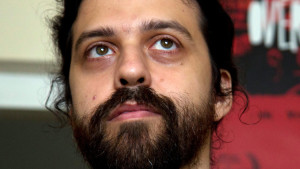MIGUEL COYULA, FILMMAKER, “MAR ROJO” WRITER.
Miguel Coyula Aquino (born March 31, 1977 in Havana) is a Cuban filmmaker and writer.
At age 17, he made his first short with a VHS camcorder, which led to his admittance to Escuela Internacional de Cine y Television (The International Film and Television School) of San Antonio de los Baños, Cuba (EICTV).
Since then he has won awards in his country with his short films Bailar Sobre Agujas (1999), Buena Onda, (1999), and Clase Z “Tropical” (2000). His work has always been shot on very low budgets, his features taking several years to complete, using heavy digital manipulation in postproduction.
In 2000, he traveled to the United States on an invitation from the Providence Latino Film Festival. While visiting New York, he met Anna Strasberg of the Lee Strasberg Theatre Institute and after screening his thesis film was offered a scholarship. While attending the Strasberg Institute, Coyula made his first feature, Red Cockroaches (2003), for less than $2000 over a two-year period. The film was described by Variety as “a triumph of technology in the hands of a visionary with know-how…” The film won over twenty awards in film festivals around the world.
In 2009, Coyula was awarded the Guggenheim Fellowship by The John Simon Guggenheim Memorial Foundation for developing his second feature, the film Memories of Overdevelopment, a follow-up to the Cuban classic Memorias del Subdesarrollo (1968), based on the novel by Cuban writer Edmundo Desnoes. After its world premiere at the Sundance Film Festival, the film went to gather several awards and honors. The International Film Guide described it as one of the best films Cuba has produced.
After the Guggenheim Fellowship ended in 2010, Coyula began working on his third feature, Corazon Azul (Blue Heart). In 2013 La Pereza Ediciones published his first novel Mar Rojo, Mal Azul.
Filmography.
Pirámide (1996)
Válvula de luz (1997)
Detalles (1998)
Idea (1998)
Buena Onda (Nice Going) (1999)
Bailar sobre agujas (Dancing on Needles) (1999)
Clase Z “Tropical” (2000)
El Tenedor plástico (The Plastic Fork) (2001)
Cucarachas rojas (Red Cockroaches) (2003)
Memorias del Desarrollo (aka Memories of Overdevelopment) (2010)
Blue Heart (in production)
Awards.
Miguel Coyula has won several awards for his two features and shorts
Memories of Overdevelopment[edit]
Memorias del Desarrollo has won 20 awards, including:
Audience award for Best Foreign Film, Mostra Principal, Arraial CineFest, Brasil, 2012
Best Director of Latinamerican Section, Málaga Film Festival, Spain 2011
Best Film, Muestra Nacional de Nuevos Realizadores, Cuba, 2011
Special Award, Premios ACE, USA, 2011
Cine Latino Award, Washington DC Independent Film Festival, USA, 2011
Most Innovative, Cero Latitud Film Festival, Ecuador, 2010
Best Narrative Feature, Dallas Video Fest, USA, 2010
Best Feature, New Media Film Festival, USA 2010
Special Mention, Cine Las Americas International Film Festival, USA, 2010
Best Film, Havana Film Festival New York, USA, 2010
Red Cockroaches.
Red Cockroaches has won 23 awards, including:
Best Editing, Fearless Tales Genre Festival, USA, 2005
GreenCine Online Film Festival, New Media Film Festival, USA, 2005
Best Film, Microcinema Festival, USA, 2004
Special Jury Award, Muestra de Jóvenes Realizadores, Cuba, 2004
Gran Premio Plaza, Festival Cineplaza, Cuba 2004.
Special Mention for Visual Concept, Buenos Aires Rojo Sangre, Argentina, 2004
Best Editing, Encuentro Nacional de Video, Cuba, 2004
Special Mention, Festival Internazionale de la Fantascienza, Italy, 2004.
Best Feature, Festival Almacén de la Imagen, Cuba, 2003
Clase Z “Tropical”[edit]
Clase Z “Tropical” is a short has won 9 awards, including:
Best Experimental Video, Encuentro Nacional de Video, Cuba 2001
FIPRESCI Award, Festival Almacén de la Imagen, Cuba 2000.
Wiki/Agencies/YouTube/InternetPhotos/TheCubanHistory.com
The Cuban History, HOLLYWOOD.
Arnoldo Varona, Editor.
MIGUEL COYULA, CINEASTA, ESCRITOR DE MAR ROJO, MAL AZUL” .
Miguel Coyula Aquino (nacido el 31 de marzo 1977 en La Habana) es un director de cine y escritor cubano.
A los 17 años, hizo su primer corto con una cámara de vídeo VHS, que llevó a su ingreso a Escuela Internacional de Cine y Televisión (The Film and Television School) de San Antonio de los Baños, Cuba (EICTV).
Desde entonces, ha ganado premios en su país con sus cortometrajes Bailar Sobre Agujas (1999), Buena Onda, (1999) y Clase Z “Tropicales” (2000). Su trabajo siempre se ha disparado en los presupuestos muy bajos, sus características que toman varios años para completar, mediante la manipulación digital pesada en postproducción.
En 2000, viajó a los Estados Unidos en una invitación del Festival de Cine Latino de Providencia. Durante su visita a Nueva York, conoció a Anna Strasberg del Instituto de Teatro Lee Strasberg y después de la detección de su película de tesis se le ofreció una beca. Mientras asistía al Instituto Strasberg, Coyula hizo su primer largometraje, Cucarachas rojas (2003), por menos de $ 2,000 en un período de dos años. La película fue descrito por la revista Variety como “un triunfo de la tecnología en las manos de un visionario con saber hacer …” La película ganó más de veinte premios en festivales de cine de todo el mundo.
En 2009, Coyula fue galardonado con la beca Guggenheim por la Fundación John Simon Guggenheim Memorial para el desarrollo de su segundo largometraje, la película Memorias del Desarrollo, un seguimiento de las Memorias clásica cubana del Subdesarrollo (1968), basada en la novela del escritor cubano Edmundo Desnoes. Tras su estreno mundial en el Festival de Cine de Sundance, la película fue a reunir a varios premios y honores. La Guía Internacional de Cine de la describió como una de las mejores películas de Cuba ha producido.
Después de la beca Guggenheim terminó en 2010, Coyula comenzó a trabajar en su tercer largometraje, Corazón Azul (Blue Heart). En 2013 La Pereza Ediciones publicó su primera novela Mar Rojo, Mal Azul.
(LEA DE SUS FILMS Y PRODUCCIONES EN LA SECCION EN INGLES.)
Wiki / Agencias / YouTube / InternetPhotos / TheCubanHistory.com
The Cuban History, HOLLYWOOD.
Arnoldo Varona, Editor.





